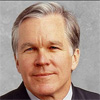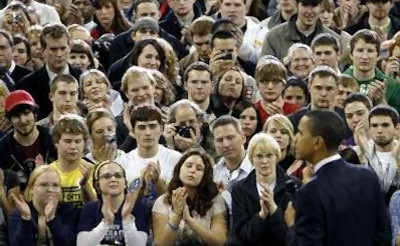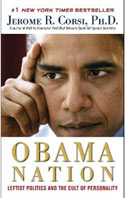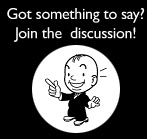 As reported by the Huffington Post, the New York Times Bill Keller compares Obama to Nelson Mandela:
As reported by the Huffington Post, the New York Times Bill Keller compares Obama to Nelson Mandela:
The executive editor of The New York Times, Bill Keller, sees "unmistakable" similarities between the campaigns of Barack Obama and Nelson Mandela, he said in a podcast interview on the paper's website.The interview, done for the New York Times Book Review, is on the subject of Keller's young adult biography of Nelson Mandela, whom he covered. Asked about Obama, Keller calls him "fascinating."
From the audio transcript of the interview with Ben Keller, kindly via Ben Smith @ Politico:
You want to be careful about drawing historical parallels between societies that are so different, but there are a couple of similarities that, if you watch what happened South Africa, that are unmistakable in the Obama campaign.One is the inspirational quality of it. Mandela, like Obama, although he wasn’t always the most riveting public speaker, was the kind of speaker who didn’t dwell on the details of his ten-point program, but went for emotional lift. He was appealing to the higher sense of purpose and history in his public appearances, as Obama does.
And the other thing is that both of them, in a way, transcended race — at least, to a degree transcended race. Colin Powell used to use this line when people used to try to draw him into conversations abot race and what it was like to be the first black secretary of state, the first black this, the first black that, and he would say, "I ain’t that black."
And what I think what he meant by that was not just that he was light-skinned, but that he didn’t grow up as preoccupied by race as a lot of other African-Amercans who rose to prominence. And something of the same thing can be said about either Mandela or Obama — that they somehow rose above race while still clearly being black.
As to be expected, Cynics and Doubters are interjecting that this is only a comparison of Obama's presidential campaign, not a comparison of the men themselves.
However, inasmuch as the campaigns are extensions of the campaigner, we suspect Keller may be simply tuning into an already-present Obasmic Vibe permeating the ranks of his followers. Consider:

- A mural of Martin Luther King, Nelson Mandela and Obama Barack by an artist circa. the CNN Democratic Debates. From the interview with the artist (MP3 download):
[Artist:] "We wanted to do some kind of piece that illustrates his campaign and the change that America, the whole world is having. Barack's going to be the next person to take us to -- the next spot. Barack's going to bring the whole unit-, unit- the whole nation together - NO MORE Red States, NO MORE Blue States, ONE NATION."
[In response to the question: What does Obama do that you feel warrants a comparison?]
"Nelson Mandela and Martin Luther King were both revolutionary figures. They did it because they were passionate about what they were doing. Barack's the same way. He hasn't been a senator for that long. But you know he's coming in here, he's doing it because he wants to, but also because he feels like he's CHOSEN to do this. You know our nation right now needs something, needs some CHANGE, needs something to SHAKE THINGS UP."
[In response to the question: "You've obviously listened to a speech or two of his. What do you feel when he's speaking?]
"Honestly, he gives me chills. When you listen to him, the only other person that can compare is Martin Luther King Jr.
- From Barack-Obama.TV, a podcast interview in which Obama "discusses his tour of Robben Island prison where Nelson Mandela spent 27 years of his life and still maintained his spirit and vision." September 9, 2006.

- Obama's First Coming (The Australian February 9, 2008), in which Washington correspondent Geoff Elliott recalls:
IT was early 1994 when Nelson Mandela gave a speech in a slum outside Cape Town and spoke in grand terms of a new beginning and how when he was elected president every household would have a washing machine.
People took him literally. A few months later he became South Africa's first black president. That's when clerks in department stores in Cape Town had to turn people away demanding their free washer and dryer.Having spent some time as a reporter in South Africa watching the Mandela presidency I was reminded of that story this week when I travelled with Democratic presidential candidate Barack Obama on the campaign trail.
How does a cult figure, in the eyes of some something akin to a messiah, make the transition to a political frontrunner - president even - where disappointment will soon crush what seemed to be a journey to a promised land?
Looking into the faces of a more than 16,000-strong crowd in a basketball stadium in Hartford, Connecticut this week, the Mandela magic I'd seen before was there too. Black and white, and the youth; they appeared in a state close to rapture watching Obama speak. Here and there one could see women crying and the some men wiping away tears too.




